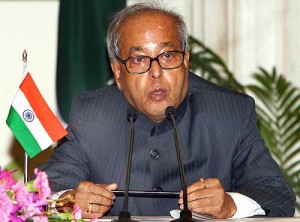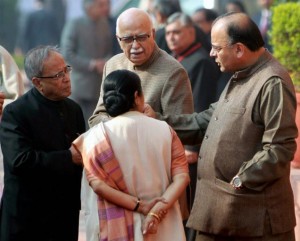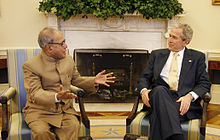
Pranab-Mukherjee
Know more on Pranab Mukherjee:

Pranab Kumar Mukherjee; born 11 December 1935, Mirati; West Bengal, India) is the current Finance Minister of India and leader of the current 15th Lok Sabha. . He is currently the UPA nominee for the 2012 Presidential Election.
Mukherjee is a senior member of the Cabinet Committees on Economic Affairs, Infrastructure, Parliamentary Affairs, Political Affairs, Prices, Security, Unique Identification Authority of India, World Trade Organization, and heads the Group of Ministers Committee on the Dabhol dispute. He is a member of the Congress Working Committee (CWC).

Early life
He belongs to a Bengali Hindu Kulin Brahmin family.His father Kamada Kinkar Mukherjee was a member of AICC, and West Bengal Legislative Council (1952–64), and President, District Congress Committee, Birbhum (WB). He attended the Suri Vidyasagar College, Suri (Birbhum), then affiliated with the University of Calcutta.
He holds a Master of Arts degrees in History and Political Science & has a degree in law from the University of Calcutta. He has been an advocate and a college teacher in his long public career.[citation needed] In 2011 he was awarded an honorary Doctor of Letters degree by University of Wolverhampton.
Professional career
Mukherjee began his career as a college-teacher and later as a journalist. His height is only 5 feet 1 inches.He worked for noted Bengali publicationDesher Dak (Call of Motherland). He also became trustee of Bangiya Sahitya Parishad and later President of Nikhil Bharat Banga Sahitya Sammelan. Political career
He has a parliamentary career of over four decades, which began as a member of Rajya Sabha (upper house) from the Congress Party in 1969; he was re-elected in 1975, 1981, 1993 and 1999. In 1973, he joined the cabinet as Union Deputy Minister, Industrial Development. He rose through a series of cabinet posts to become the Finance Minister of India from 1982 to 1984. His term was noted for India not withdrawing the last billion instalment of an IMF loan. Dr. Manmohan Singh was serving Reserve Bank of India as Governor during Pranab’s term as Finance Minister. He was not included in Rajiv Gandhi’s cabinet after Lok Sabha election held subsequent to Indira Gandhi’s assassination. He was pushed out of the Congress party for a brief period, and during this period he formed his own political party Rashtriya Samajwadi Congress, but later merged it with Congress party in 1989 after settlement with Rajiv Gandhi. His political career revived when P.V. Narasimha Rao chose to appoint him as deputy chairman of the planning commission and subsequently as a union cabinet minister. He served as External Affairs Minister for the first time from 1995 to 1996 in Rao’s cabinet. In 1997 he was voted Outstanding Parliamentarian.
He was the President of the West Bengal state unit of Congress since 1985, but resigned in July 2010 due to work-load and was succeeded by Manas Bhunia. In 2004, when the Congress formed a government at the head of a coalition the new Congress Prime MinisterManmohan Singh was only a Rajya Sabha MP. So Pranab Mukherjee was made Leader of the House in the Lok Sabha when he won the Lok Sabha elections for the first time from Jangipur (Lok Sabha constituency). He also has the distinction of being a Minister for various high profile Ministries including Defence, Finance, External Affairs, Revenue, Shipping, Transport, Communication, Economic Affairs, Commerce and Industry. He also heads the Congress Parliamentary Party and the Congress Legislative Party which consists of all the Congress MPs and MLAs in the country apart from being Leader of the House in Lok Sabha, Bengal Pradesh Congress Committee President and the Union Cabinet Minister of Finance in the Council of Ministers under Prime Minister Manmohan Singh in the Congress-led Government. Pranab played crucial role in steering the Cabinet pre Lok Sabha elections when the Prime Minister underwent by-pass surgery by taking additional charges as chairman of the Cabinet Committee Of Political Affairs and Union Minister in Finance Ministry despite already being Union Minister of External Affairs.
International role

Pranab Mukherjee played a central role in the implementation of the Indo-US civilian nuclear agreement.
Mukherjee and US Secretary of State Condoleezza Rice signed the Section 123 Agreement on October 10, 2008. He has been a member of the Board of Governors of the International Monetary Fund, of theWorld Bank, of the Asian Development Bank, and of the African Development Bank.
In 1984, he chaired the Group of 24 attached to the IMF and World Bank. Between May and November 1995, he presided over the SAARC Council of Ministers Conference.
He was the first appointed by the Prime Minister, Manmohan Singh, to ease issues over the campaign initiated by Anna Hazare on day 8 of his fast, that is 23 August 2011.
Political party role
Mukherjee is very well respected within the party social circles.” Other media accounts describe him as having “a reputation as a number-crunching politician with a phenomenal memory and an unerring survival instinct.”
After Sonia Gandhi reluctantly agreed to join politics, Mukherjee was one of her key mentors, guiding her through difficult situations with examples of how her mother-in-law, Indira Gandhi would have done things. Mukherjee’s unfailing loyalty and competence have led to his closeness to Sonia Gandhi and Manmohan Singh, and helped him gain the position of Minister of Defence when the party came to power in 2004.
He has also held the position of Deputy Chairman, Planning Commission from 1991 to 1996.
His talents were on display during the negotiations for the Patent’s Amendment Bill in early 2005. The Congress was committed to passing an IP bill, but their allies in the United Progressive Alliance from the Left front had a long tradition of opposing some of the monopoly aspects of intellectual property. Pranab Mukherjee, as Defence Minister, was not formally involved but was roped in for his negotiation skills. He drew on many old alliances including the CPI-M leader Jyoti Basu, and formed new intermediary positions, which included product patent and little else. Then he had to convince his own colleagues including commerce minister Kamal Nath, at one point saying: “An imperfect legislation is better than no legislation.” Finally the bill was approved on March 23, 2005.
Foreign Minister: October 2006

Pranab Mukherjee with US PresidentGeorge W. Bush in 2008.
On 24 October 2006, he was appointed as the External Affairs Minister of India. His replacement in the Defence Ministry is A. K. Antony, a senior Congress Party politician and former Chief Minister of the southern state of Kerala.
Mukherjee was briefly considered for the post of the largely ceremonial Indian presidency. But his name was subsequently dropped after his contribution in the Union Cabinet was considered practically indispensable. Among Mukherjee’s current legacy was the successful signing of the U.S.-India Civil Nuclear Agreement with the US government and then with the Nuclear Suppliers Group, allowing India to participate in civilian nuclear trade in spite of not having signed the Nuclear Non-Proliferation Treaty. He is also awarded the Padma Vibhushan, India’s second highest civilian honor in 2007.
Finance Minister

Pranab Mukherjee, Finance Minister of India addressing the delagates at Regional Conference of Institute of Chartered Accountants of India
Pranab Mukherjee’s first stint as the Finance minister of India was during the Indira Gandhi government in 1982. He presented his first annual budget in 1982-83. In the second government of Manmohan Singh, he again became the Finance Minister of India, a job he had held earlier, in the 1980s. On July 6, 2009, he presented the government’s annual budget. In it, he announced many tax reforms, such as the scrapping of the ‘irritant’ Fringe Benefits Taxand the Commodities Transaction Tax. He announced, that the Finance Ministry, was well on track, to implement the Goods and Services Tax, a tax, that has been praised by major corporate executives, and economists. He also expanded funding for social sector schemes, like the National Rural Employment Guarantee Act, girl’s literacy, and health care. Also, he expanded infrastructure programmes, like the National Highway Development Programme, expansion of electricity coverage, and the Jawaharlal Nehru National Urban Renewal Mission. However, many people, expressed concern, about the rising fiscal deficit, the highest since 1991. Mukherjee said, that the expansion in government spending was only temporary, and he said that the government, was committed to the principle of fiscal prudence. He presented the 2009 Union budget of India as well as 2010 Union budget of Indiaand the 2011 budget.
The 2010-11 budget includes the country’s first explicit target to cut public debt as a proportion of GDP and he is targeting a budget deficit reduction to 4.1% of GDP in fiscal year 2012-13, from 6.5% in 2008-09.
He is the Presidential Candidate of The United Progressive Alliance.
Contender for President
He has been named as the presidential candidate from UPA. After his unsatisfied wish to become the Prime Minister of India, Pranab Mukherjee is considered as an eligible candidate for the President of India.The elections are happening in July 2012 after the five-states scheduled elections. The current Vice-President of India Hamid Ansari, former President of India A. P. J. Abdul Kalam and former Speaker of Lok Sabha Somnath Chatterjeealong with Pranab Mukherjee are the forerunners for Presidential candidate.
Views and opinions
On corruption
In an interview to rediff.com in 1998, he was asked about the sleaze in the Congress government, in which he was the Minister for External Affairs. He replied:
- Corruption is an issue. We have dealt with it in the manifesto. But I am sorry to say that these scams are not confined to the Congress or the Congress government alone. There are so many scams. So many leaders of various political parties are involved in them. So it would be too simplistic to say that the Congress government was involved in scams.
Controversies, allegations and accusations
Mukherjee was a Minister in Indira Gandhi’s Cabinet during the infamous Emergency and was held by many to be personally responsible for some of the excesses. He was summoned before the Shah Commission but followed Mrs. Gandhi’s lead in refusing to resign before it. A police case was registered against him which was withdrawn when Mrs. Gandhi returned to power.
S. Gurumurthy and Arun Shourie exposed how Pranab Mukerjee, the then Finance Minister of India helped Reliance Industries against Bombay Dyeing through differential taxation by influencing the Income Tax Department in textile industry.[23] As a result Bombay Dyeing was almost decimated.[23]
Mukherjee was involved in handling Taslima Nasreen’s house arrest in Delhi, as the Foreign Minister. Dealing with a situation involving her expulsion for Kolkata, anger from Islamic radicals, and her protection in a safehouse, Mukherjee received criticism for actions leading to Nasreen’s eventual departure from India in March 2008.
He has also been accused of threatening banks if they invest in Gujarat by sending the Income Tax Department sleuths after them, a state governed by the Bharatiya Janata Party
Personal life
Pranab Mukherjee married Suvra Mukherjee on July 13, 1957 and has two sons, Abhijit and Indrajit and a daughter. He is inspired by Deng Xiaoping & has quoted him quite frequently. His hobbies are reading, gardening and music.
Honours, awards and international recognition
In 1984, he was rated as the best Finance Minister of the World according to a survey of Euromoney magazine. In 2010 he was awarded “Finance Minister of the Year for Asia” by Emerging Markets, the daily newspaper of record for the World Bank and the International Monetary Fund (IMF). In December 2010 The Banker recognised him as “Finance Minister of the Year” after making significant inroads into budget deficit reduction, throughout a turbulent year.
| Pranab Mukherjee | |
|---|---|
 |
|
| Minister of Finance | |
| Incumbent | |
| Assumed office 24 January 2009 |
|
| Prime Minister | Manmohan Singh |
| Preceded by | Manmohan Singh |
| In office 15 January 1982 – 31 December 1984 |
|
| Prime Minister | Indira Gandhi Rajiv Gandhi |
| Preceded by | Ramaswamy Venkataraman |
| Succeeded by | Vishwanath Pratap Singh |
| Minister of External Affairs | |
| In office 24 October 2006 – 23 May 2009 |
|
| Prime Minister | Manmohan Singh |
| Preceded by | Manmohan Singh |
| Succeeded by | Somanahalli Mallaiah Krishna |
| In office 10 February 1995 – 16 May 1996 |
|
| Prime Minister | Narasimha Rao |
| Preceded by | Dinesh Singh |
| Succeeded by | Atal Bihari Vajpayee |
| Minister of Defence | |
| In office 22 May 2004 – 26 October 2006 |
|
| Prime Minister | Manmohan Singh |
| Preceded by | George Fernandes |
| Succeeded by | Arackaparambil Kurien Antony |
| Deputy Chairperson of the Planning Commission | |
| In office 24 June 1991 – 15 May 1996 |
|
| Prime Minister | Narasimha Rao |
| Preceded by | Mohan Dharia |
| Succeeded by | Madhu Dandavate |
| Lok Sabha representative from Jangipur, West Bengal | |
| In office 10 May 2004 – incumbant |
|
| Personal details | |
| Born | 11 December 1935 (age 76) Mirati, British Raj (now India) |
| Political party | Indian National Congress (Before 1986; 1989–present) |
| Other political affiliations |
Rashtriya Samajwadi Congress(1986–1989) |
| Spouse(s) | Suvra Mukherjee |
| Alma mater | University of Calcutta |
| Profession | Social worker Teacher Writer |
| Religion | Hinduism |




Congratulations to Shri Pranab Mukherjee. Seems from political developments that he is now the formidable President in making. People of West Bengal could not get a Prime Minsiter but will be happy to get the President. Narayan Jain, Secretary General, AIFTP